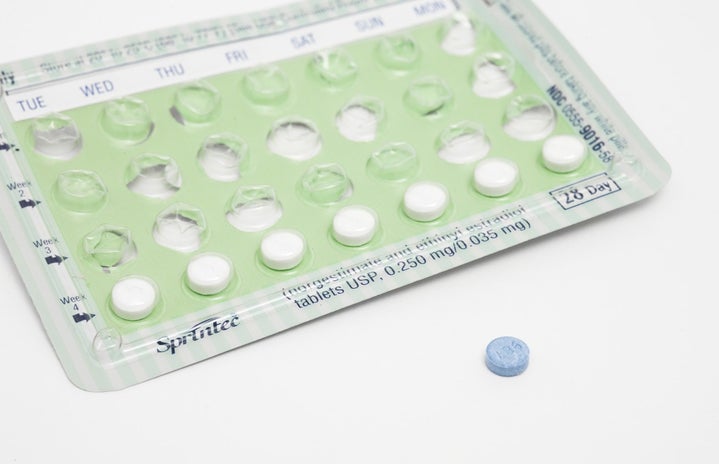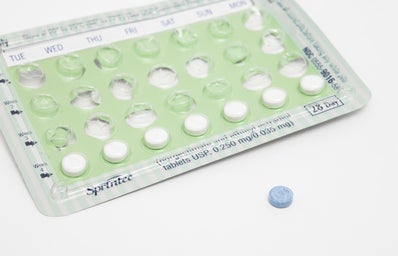Emergency contraception has come onto the market over the past several decades with many supporters and critics alike. However, you may be wondering how exactly pills like Plan B work and if there are any other brands out there. Luckily, Her Campus is here to give you the lowdown on how emergency contraception works!
What is emergency contraception?
At its simplest, emergency contraception involves measures you take after having sex to prevent pregnancy in the case of unprotected intercourse. Typically emergency contraception is used if other pre-coital preventative measures (like the pill, condoms or other birth control methods) failed.
Emergency contraception doesn’t just come in the form of the pill; contraception such as an intrauterine device, or IUD (T-shaped coil inserted into the uterus), also works, but it may not effectively prevent pregnancy depending on when you have it inserted after having sex.
How does the morning-after pill work?
First off, it’s important to note that you don’t have to wait until the next morning to take the morning-after pill! If you had unprotected sex (for example, you didn’t use a condom, or the condom fell off or broke) and you worry you may become pregnant, you are absolutely allowed to take it right after intercourse.
Additionally, you can take the morning-after pill within three to five days after having unprotected sex (depending on the pill you use), though its effectiveness decreases the longer you wait after three days. Taking Plan B within 24 hours of having unprotected sex is 95 percent effective; it’s still around 90 percent effective if taken within the first 72 hours. If you’re worried about how well Plan B will work based on how long ago you had unprotected sex, feel free to check out Plan B’s calculator.
What’s the science behind the pill?
One of the biggest misconceptions about the morning-after pill is how it works. “The hormones act to delay ovulation (release of the egg from the ovaries), thereby preventing sperm from fertilizing the egg,” says Dr. Thomas McLarney, medical director of Wesleyan University’s Davison Health Center. “However, if ovulation has already occurred, the morning-after pill would not be effective.”
Dr. McLarney also makes an important distinction about how emergency contraception works. “Some of my patients will ask me if the morning-after pill induces abortion,” he says. “The answer is no. If fertilization has already occurred, the morning-after pill will most likely not affect the pregnancy.” Thus, the morning-after pill cannot be used as an abortion pill.
What emergency contraception is out there?
Believe it or not, Plan B is not the only emergency contraception pill on the market! There are a couple of major brands to look for, all of which have small nuances that make them different from one another.
Plan B
Plan B is the most well known of the emergency contraception brands and can be found in most drugstores in the family-planning aisle. It is an over-the-counter pill (so you do not need a prescription to buy it), and you should take it within 72 hours of having unprotected sex.
Additionally, anyone regardless of age can buy the pill without having to show ID. Plan B costs around $40 to $50 depending on where you buy it.
Another huge source of confusion amongst collegiettes is the difference between Plan B and Plan B One-Step. Both are actually the same thing, with “Plan B” just being an abbreviated name for Plan B One-Step.
Next Choice One Dose
Next Choice One Dose is a generic form of Plan B (though just as effective) that can also be bought over-the-counter. It is also typically cheaper than Plan B, costing around $35 to $45.
The big difference with Next Choice One Dose is that you may have to show a pharmacist a government-issued ID (like a driver’s license) to prove that you’re 17 years or older; otherwise, you need to have a prescription to buy it.
My Way
My Way is another generic form of Plan B that runs in the $35 to $45 range. Like Next Choice One Dose, you may need to show your ID to prove you are 17 or older or have a prescription from a healthcare provider if you are younger than 17.
One other feature that My Way has is the My Way Pharmacy Request Card, which you can use if you’re on the go or embarrassed to talk about emergency contraception at the pharmacy. All you do is download the app and show the card on your phone to the pharmacist (without having to verbally ask for the morning-after pill), and he or she will process your order.
ella
Another emergency contraception brand, ella, is suggested to be more effective and better tolerated (i.e. less likely to make you sick) than Plan B and its generics because it uses different mechanisms to prevent pregnancy (it suppresses progesterone, keeping your body from ovulating, making it so no eggs can meet sperm). It’s important to note, though, that this efficiency comes at a price; ella typically runs around $55 to $60, and you need a prescription from a healthcare provider to get it.
However, if you don’t want to go into your doctor and pharmacy to get a prescription, there are online pharmacies that will require an online diagnostic consultation before you order the pill online. It then comes to your door the next day in discreet packaging.
Side Effects
Dr. McLarney notes that side effects may vary from person to person. “The major side effect of the morning-after pill is nausea, and to a lesser extent, vomiting,” he says. “If someone vomits within two hours of taking the pill, they should take another dose. Side effects of oral contraceptives in general include breast tenderness, bloating, alteration in menstrual bleeding and mood changes.” Dr. McLarney also says that these side effects are typically short-lived.
Julie*, a rising junior at the University of Florida, used Plan B after her birth control failed and says she felt extremely nauseous for several days afterward. “I couldn’t do much other than lay in bed and watch TV,” she says. “Part of this was physical, but I think I was also emotionally exhausted from the whole situation.”
Jordan Gross, a trained sexual health advocate at New York University who educates students on campus about contraception, notes that college women should also seek a support system (like a doctor or therapist) or have medical assistance on hold in case side effects last longer than a couple of days. “Figure out who can take care of you if you have a bad reaction to the morning-after pill or are feeling emotionally drained,” she says.
What should you know before using emergency contraception?
Her Campus spoke to several collegiettes about their experiences taking emergency contraception so that you can know what to expect when buying and using a morning-after pill.
Have a plan before you need to use it
Mary*, a junior at Wesleyan University, encourages collegiettes to think in advance about what they’d do in a situation where they’d need to use emergency contraception.
“When I had an incident where my original method of birth control failed (the condom broke), I was so perplexed about what I was supposed to do,” she says. “I think all college women should think about what they’d do in a situation of accidental unprotected sex so that there’s an ‘action plan’ in place.”
Gross adds that there are many factors to consider in the case of an incident. “Where would you purchase the morning-after pill—in an actual pharmacy, or online?” she asks. “Would you tell your partner, friends or parents? How will you make sure you’re not pregnant? These are things that college women should consider before they end up in a situation where they need to use a morning-after pill.”
Know who shouldn’t be taking the pill
It’s just as important to understand why you should not take the pill as why you should. Dr. McLarney notes that reasons not to take any form of oral hormonal contraception (daily birth control or the morning-after pill) include pregnancy, breast-feeding, coronary artery disease, liver disease, thromboembolic disorders (since blood clots caused by these can be fatal), certain cancers including breast cancer, hypertension, certain types of migraine headaches and liver disease.
Emergency contraception is not regular birth control
Gross also strongly recommends never using emergency contraception as a go-to method of birth control. “The morning-after pill can make you feel really sick, and it’s just not healthy to be taking every time you have unprotected sex,” she says. “Emergency contraception is meant to be just that: used in an emergency.”
While Plan B and other emergency contraception providers don’t spell out specific guidelines for how often you can take the morning-after pill in a given period of time, all of them echo Gross’s sentiments that emergency contraception is only meant to be taken in urgent situations and that other birth control precautions should be taken regularly.
It doesn’t protect against STDs
Gross also notes that morning-after pills like Plan B do not protect against STDs or STIs; they are strictly trying to prevent pregnancy after sex. “Make sure you’re still using other forms of protection to prevent disease or infection, like condoms!” she says.
Talk to someone at your college’s health center
If you’re not sure whom to talk to about emergency contraception, Julie also recommends talking to someone at your college’s health center. “The director of sexual health there gave me all the information I needed on what to expect when I took the pill,” she says. “It made me feel so relieved to know that my side effects (like nausea and headaches) were normal, and I also felt much better knowing that there was someone I could turn to if things weren’t going well physically or emotionally or if I had other questions.”
Overall, Dr. McLarney notes that emergency contraception has evolved over the past several decades (especially over the last couple of years). “Emergency contraception has added such an important facet to reproductive health,” he says. “It is simple to take (most regimens are a single dose), effective, low side effects and available over the counter. It had been significantly underused in the recent past. That appears to be changing with education and easy availability.”
Collegiettes should consider in advance what they’d do in the event they need to take emergency contraception. Think about it beforehand, and always try to take preventative birth control measures before sex.

